While researchers seek alternatives to lithium ion dominance in the battery space and European carmakers and governments pour billions into local battery production capacity to reduce import dependence, the leaders in the EV space cement their position with—that’s right—batteries.
Tesla is the most sold battery electric vehicle globally as of end-2018. Nissan with its Leaf EV is third. China’s BYD is also in the top ten. The common denominator that makes them leaders in their field is batteries.
Industry commentator Nick Cox wrote recently for Seeking Alpha that BYD had allocated some US$1.5 billion in investment for a new battery factory. By next year, the factory should be operational with an output of an impressive 100 GWh. That would be a tenth of what China’s EV market would need in terms of battery supply by 2030, according to BYD’s founder and chairman.
Given that China is the world’s largest singe EV market and likely to remain so in the observable future, having a tenth of its total battery production capacity makes for a pretty solid position not just locally, but internationally as well: BYD is already supplying batteries to Toyota. There is no reason for it not to expand its partnerships as other carmakers continue struggling with the battery issue on several levels including cost, range, and reliability. Related: Oil Rises On U.S. Shut-Ins, Impressive Chinese Data
Tesla, meanwhile, is reportedly working on its own battery cells. CNBC carried a report in late June, citing company employees, that the carmaker was developing its own battery cells despite its long-running battery partnership with Panasonic. Striving for independence in the battery segment makes sense: Elon Musk has complained in the past of battery constraints that have affected Tesla production and deliveries. There have also been reports of a cooling off between the partners and the development of proprietary battery cells fits in with this narrative. Even if the speculation about the cool-off is untrue, Tesla would certainly do its best to avoid battery constraints in the future.
Nissan, for its part, is taking another approach. The third-best selling EV in the world has, it turns out, very durable batteries. They last longer than the productive life of the Leaf so the company is building demand for battery storage. One of its projects, in the UK, offers people Nissan Energy Solar: a package of solar panels, battery storage, and a control system. In other parts of the continent the Leaf can be connected to the grid. A third branch of Nissan’s battery demand creation is working on turning the Leaf batteries into a power source for street lights so these can be taken off the grid.
Bloomberg New Energy Finance in January released a forecast that saw EV sales at 2.6 million this year. That would be a 40-percent increase over 2018, which, although a lot smaller than the 70-percent annual jump in EV sales from 2017, is still quite a respectable growth rate.
For all their stated ambitions in this space, large European carmakers and their U.S. counterparts have yet to stake an actual claim in EVs and they are coming a bit late to the party. Tesla, BYD and Nissan will likely continue to be leaders in this space for a while.
By Irina Slav for Oilprice.com
More Top Reads From Oilprice.com:
- Middle East Tanker Insurance Rates Soar 10-Fold
- Why This Oil Rally Won’t Last
- Oil & Gas Discoveries Rise In High-Risk Oil Frontiers


















